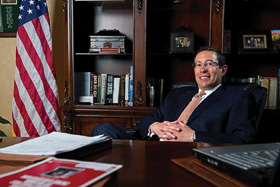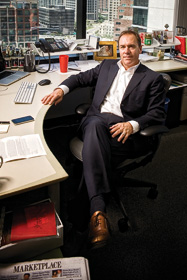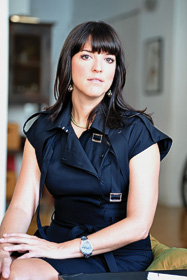Driving the Economy
As business leaders in an increasingly interdependent world, alumni maneuver changes
in technology, trade and regulations.
September 15, 2010

John Magee (’94) has helped build Crane Worldwide Logistics into a global trade and
transportation powerhouse in 19 countries. (Photo by Angilee Wilkerson)
When Houston-based transportation and logistics company EGL was the victim of a hostile takeover, John Magee (’94) pulled together a team of executives to start a new business — two years later, Crane Worldwide Logistics now has a global presence in 19 countries.
Phil Sorgen (’88, ’90 M.B.A.) has maneuvered through two decades of economic ups and downs to rise in the ranks of Microsoft Corp., one of the world’s largest multinational corporations.
And Roxanne Paschall (’94) is embracing technology in e-commerce to meld marketing and customer service opportunities for Gucci America, her most recent professional challenge in a merchandising career with European luxury labels.
Technological changes are requiring a more highly skilled work force than ever before. But with an increasingly interdependent global economy, it’s also crucial that professionals have a sound foundation in decision logic and know how to collaborate, work with other cultures and manage unexpected challenges.
UNT’s business and merchandising alumni, drawing on lessons learned as students, are working as global leaders to help connect local business with world markets and technology as engines of change and wealth.
“We are preparing students to deal with global business issues by offering a variety of international business courses,” says O. Finley Graves, dean of the College of Business. “We also offer travel abroad opportunities, welcome visiting professors from around the world and are establishing new international teaching and research partnerships. As future business leaders in a global economy, our graduates need to understand that there are deep cultural, legal and regulatory differences that affect how business is done.
“The world is not flat.”
Real Solutions
Common threads
After the takeover of EGL, Magee waited for a one-year non-compete agreement to expire. Then, in 2008, as president of the new Crane Worldwide Logistics, he rallied employees from EGL to join the company with a new vision. They worked to better use the web and a single global interface system to connect with vendors and customers electronically.
“We now help drive the global economy by facilitating trade and transportation,” Magee says. “A swelling economy can’t exist without logistics services to get a project from one point to another — transforming raw goods to a finished product.”
Magee stresses that logistics is key to addressing 21st century globalization issues of rising fuel costs, foreign currency exposure and international compliance in exporting and importing.
“Logistics is helping to grow regional manufacturing, for example, in Eastern Europe for Europe and the Middle East, in Mexico for the Americas and in China for Asia,” says Magee, who credits UNT for instilling in him a solid business foundation.
UNT’s logistics and supply chain management program tied for 22nd in the world for research productivity in 2009, according to the Transportation Journal. It is the nation’s seventh largest program.
“I am proud to be in an industry where UNT is in the top echelon of educators,” Magee says, adding that it was during his senior project as a marketing major that he learned the power of collaboration.
“Teamwork is important in today’s industry. When you’re trying to operate at the top level globally, finding the best person in Frankfurt to match your person in Shanghai and in Sao Paulo is important,” he says.
“You have to drive the right culture that not only attracts the best, but gives them a common thread so they work well together and deliver the best results.”
North Star focus
As president of Microsoft Canada, Sorgen oversaw the country’s business and was responsible for expanding global competitiveness initiatives. He was so successful that the seasoned leader was promoted this year to corporate vice president for the small- and mid-market solutions and partners business in the United States.
Whether he’s helping deliver technology-based business solutions across the country or on a global scale, Sorgen says it’s important to know your core customers and stay focused on the end goal.
“The best strategy for success is to understand your customers,” he says. “They are your North Star.”
In his more than 14 years with the software giant, Sorgen has helped to steer the company, riding the waves of the dot-com era, the bust, the growing economy that incurred massive debt and now the economic reset of the past two years.
“Investing in future innovative solutions with rigor and operational excellence keeps Microsoft competitive,” says Sorgen, who also traces his leadership skills back to lessons he learned at UNT while earning his undergraduate degree in business administration and his M.B.A. in marketing.
“The balance of academic and leadership opportunities that UNT offers is truly my story,” he says.
Sorgen got involved on campus and took advantage of the many diverse organizations. As a freshman peer counselor, a member of NT40 (a student leadership organization on campus) and an officer in the Interfraternity Council, he says he learned how to take charge while remaining collaborative.
“Having to collect your thoughts and speak in front of hundreds of parents at orientation was one of many invaluable experiences,” he says. “Beyond academic pedigrees and GPAs, these are the things that count. At the time, I thought I was doing something purely for the university, but now I know I was also doing something for myself.”
Adding value

Serial entrepreneur Richard Francis Gonzalez’(’90) most recent ventures, Phoneraiser
and Recycle to Eradicate Poverty, help microfinance loans in Central and South America.
(Photo by Gary Payne)
Richard Francis Gonzalez (’90) also approaches business with innovation and hard work. Gonzalez, a first-generation American Latino and college graduate, says his parents came to the U.S. 42 years ago, not understanding English and with less than $50 in their pockets, to build their American dream.
As a business student at UNT, Gonzalez jumped on the fast track to success and started a company promoting concerts to other students on Fry Street in Denton and Deep Ellum in Dallas.
“The core of entrepreneurship is having vision, integrity, character — what your parents teach you,” he says. “I ask, ‘How do I add value to another company or how can my product or service impact and change people’s lives?’”
Today, Gonzalez — president of Crescent Group Corp., a holding company for four of his businesses — is a serial entrepreneur who builds ventures that follow his passions. He licensed World Cup products in homage to his dad, a former professional soccer player in Paraguay, where Gonzalez also built an oil company.
Most recently, he is providing affordable cellphones and PDAs in South America while helping organizations raise funds for their cause. His company, Phoneraiser, works with thousands of U.S. organizations to recycle cell phones and printer cartridges. Paying the organizations between 50 cents and $300 per cellphone or PDA, Phoneraiser has written more than $2 million in checks to schools, nonprofits, churches and individuals.
Gonzalez also founded Recycle to Eradicate Poverty, a program that benefits Chiapas Project International, to fund microfinance loans in Central and South America.
UNT was the first university to partner with the Chiapas Project in 2007, and now 20 other universities have followed suit.
“Chiapas International has raised $3.3 million for seven Latin American countries. We are helping the poor rise out of poverty with dignity through microfinance,” Gonzalez says. “We’re changing people’s lives.”
A knowledge economy
Gonzalez was appointed the Honorary Consul of Paraguay for Dallas in 2007 and is a U.S. Department of State-accredited diplomat. He is playing a key role in the establishment of a Paraguayan microfinance bank. He also is watching the rising new market potential of South America and the BRIC countries — Brazil, Russia, India and China.
“We are in a knowledge economy, and with the Internet, everyone around the world has access to raw knowledge information,” he says. “The key is being able to decipher, analyze and transform the information into the knowledge.”
UNT’s College of Business is providing learning opportunities that help students solve these new global issues through collaborative programs. Visiting professors represent Korea, Chile and France, while a summer study abroad management course in Greece and Italy exposes undergraduates to the cultural influences on organizational functions and decision making. International opportunities for faculty include a research workshop exchange with Monterrey Tech in Mexico.
And the new 180,000-square-foot Business Leadership Building under construction will allow for more webinars and online education not just for students and faculty but for executives, building a stronger bridge to the business community.
“New business graduates must have a global viewpoint along with information tech skills,” Gonzalez says. “Thankfully UNT’s business programs are giving them real-world experience to take with them into the global market.”
Different cultures

Robert Dobrient (’85) leads Savoya, a global chauffeured ground transportation management
service company that operates in 55 countries. (Photo by Angilee Wilkerson)
Part of an in-depth understanding of today’s global market is knowing how to work with other cultures. When Robert Dobrient (’85) left Wisconsin in 1979 to play on UNT’s men’s soccer team, he wasn’t expecting 15 out of 20 members on the team to be from different countries.
“The cultural learning opportunity was incredible,” he says. “The diverse backgrounds taught me to appreciate our differences and really expanded my world view.”
Dobrient, who earned his degree in marketing, has been a successful entrepreneur using skills he developed as a student living in College Inn, when he started a courier business with a fellow student. That enterprise evolved into a third-party logistics services company that he sold in 1997. In 2000, he launched Savoya, a global provider of chauffeured ground transportation management services that now operates in 55 countries.
The company, with headquarters in Dallas and a technology center in India, caters to high-end customers such as the private jet community, event planners and the high-tech industry. Dobrient says about 65 percent of his customers book through a proprietary web application developed in-house.
“Deploying that technology put us in the lead,” he tells business students as a frequent speaker for UNT’s Murphy Center for Entrepreneurship. “But people still crave face to face connection, so our team travels constantly to visit clients and vendors.”
Study abroad
Paschall, with Gucci America, also developed her global savvy at UNT. The fashion merchandising student packed her bags for a semester abroad at Northumbria University in England, where she studied everything from design and execution of her own sketches to marketing.

Roxanne Paschall (’94) has helped set global luxury fashion trends for Europe’s top
labels, most recently as the women’s divisional merchandise manager for Gucci America.
(Photo by Sasha)
“Studying abroad was the biggest life-changing experience for me,” Paschall says. “Being enrolled in school, taking classes and living in a completely different place from Texas was a cornerstone in my life.”
The opportunity helped land her an internship with Saks Fifth Avenue in New York. From there she went on to work for European luxury labels including Prada, Hermes, Gianfranco Ferre, Louis Vuitton and Bottega Veneta, buying merchandise that spanned leather goods, silk, accessories, jeans and ready to wear.
Today, as the women’s divisional merchandise manager for Gucci America, she works in New York and travels to Italy several times a year, crafting an international image of the brand and managing the buying team. She also oversees the visual merchandising, including e-commerce.
“For us, it’s another store, even if it’s not made of brick and mortar,” she says.
The faculty in the School of Merchandising and Hospitality Management know how valuable travel opportunities are for students and have built a global perspective into the course work, says Judith Forney, dean of the school.
“We prepare graduates to create and manage experiences, services and products for consumers who are increasingly diverse in nationalities, cultures and expectations,” she says.
The school’s Asia Study Abroad Program, now in its eighth year with more than 240 alumni, offers trips to Hong Kong and China. The students live, learn and interact with global marketplace executives in merchandising and hospitality.
And a new master’s degree in sustainable tourism — the first of its kind in the U.S. — will prepare students for management and leadership
positions. The program will require one year of study at UNT and one year of study
at CATIE, an international higher education, research and development center in Costa
Rica.
Opening doors
UNT’s business program helped Melanie M. Pizzey (’86) get her start. With the help of business professor Charles Bimmerle, Pizzey submitted a research paper on inventory management to a student competition that influenced her career goals. Another faculty member, Rod Hilpirt (’71, ’75 M.S., ’89 Ph.D.) was consulting for a small electronics distribution company in Fort Worth at the time, developing a management training program at the company. He arranged an interview for her as a manager trainee.
“I opened the boardroom door to my interview, and eight senior executives of the company were sitting around the table,” she says. “It was terrifying, but they hired me as one of the first trainees of the company.”
Twenty-four years later, Pizzey is vice president of global product operations for the same company. TTI Inc. is now the world’s leading distributor of components for industrial, military, aerospace and consumer electronics manufacturers. The $1.5 billion company, a subsidiary of Warren Buffet’s Berkshire Hathaway Inc., serves logistic needs for Alcatel, BAE Systems, G.E., Honeywell and others.
“I was fortunate to be in the right place at the right time, and working my way up through every department has been very valuable,” says Pizzey, who is responsible for asset management in North America, Europe and Asia and oversees supplier systems, logistics, purchasing, training and inventory.
“When I first started, we weren’t global and couldn’t imagine video conferencing,” she says. “But today all of our locations are linked together with this great technology.”
Terrance Pohlen, associate professor of logistics in UNT’s College of Business, says students learn to deal with the complexities of an interconnected global world in preparation for a competitive business environment.
“You have to be mindful what you export and who you export to — to be careful about security requirements in an age of terrorism, import and export law and environmental concerns when more companies are going green,” he says.
Pizzey agrees that realizing the dynamics of global interdependency is important.
“It’s amazing to think that a cloud of volcanic ash from Iceland can totally disrupt a product delivery supply chain and halt business around the world, but in this global economic environment, it is a reality,” she says.
Because of her experiences on campus, she is reaching out to help future graduates. She now serves as chair of the advisory board for the Department of Management and is a board member for the College of Business.
“UNT helped me to better understand the global economic picture,” says Pizzey, who also supports an internship program at TTI to help provide the opportunities for students that were given to her.
“I love the challenge of winning new business,” she says. “We want to be the best.”